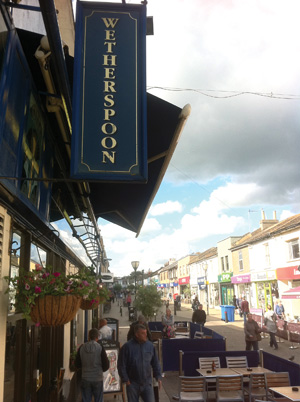News: Frank le Duc
One of Britain’s biggest pub bosses has delivered a stinging reproach after an optimistic report by industry experts

The recent campaign to save the Rose Hill Tavern in Brighton looks unlikely to be the last if the founder and chairman of Wetherspoons is to be believed. Tim Martin, 59, spoke out after analysts at Deutsche Bank published an optimistic report entitled The Chips Are Up.
Perhaps the rising price of fried potatoes gave the experts food for thought. Many pubs, after all, make more profit from “dry sales” than heavily taxed drinks. Mr Martin questioned whether the investment bank’s staff had been training for Oktoberfest before putting pen to paper. He understands the sector better than most.
In Brighton, the Rose Hill is not the only pub to have inspired a campaign to keep it open. An attempt to prevent its sale – or at least delay it – by listing it as an asset of community value looks to have been thwarted by former owner Enterprise Inns. The same pub company (pubco) also owned the London Unity in Hanover. Its closure brought regulars, neighbours and occasional customers together last year but theirs was a fruitless campaign.
In Hove, the Atlas – formerly the Stadium – stands boarded up and desolate in Old Shoreham Road as a symbol of the pub trade’s troubles. Like a number of similar establishments, it stopped trading without any fanfare and quietly closed its doors with little or no obvious resistance.
Pubs, clubs and bars in Brighton and Hove have long opened and closed and been bought and sold. The demise of the Tin Drum chain, the many reincarnations of what was long called Sherry’s, in West Street, Brighton, and the rise and fall of the various Firkins all give a flavour of the volatility in what could kindly be described as a dynamic sector.
“The pub industry is in a parlous state, with a number of doughty exceptions fighting a rearguard action”
It’s unusual, though, to hear someone as successful as Mr Martin give such a gloomy assessment. Wetherspoons has a presence in places such as West Street, Brighton, George Street, Hove, and the Brighton Marina. Across the country it has more than 900 pubs, often cavernous and not necessarily in buildings traditionally used as pubs.
Mr Martin said: “The overall pub industry is in a parlous and declining state, with a number of doughty exceptions fighting a rearguard action. Enterprise, the biggest tenanted pubco, has seen its profits halve and the second biggest, Punch, is fighting to survive. The biggest managed company, M&B (Mitchells and Butlers), has emerged from management turmoil, but Deutsche tell us that to ‘recover its lost position’ it must resolve the ‘25 per cent of its estate (which is) dragging down the rest of the group’.
“Many smaller companies have bitten the dust, including substantial managed pubcos Barracuda, Regent Inns and Laurel, to name but a few. Ten thousand pubs or so have shut down in the last decade, 15 per cent of the total, and the government continues to review the tied house system, provoked by endless stories of licensee hardship.
“The root cause of this turmoil, Wetherspoon and others believe, is tax. Pubs pay 20 per cent VAT in respect of food sales and supermarkets pay nothing, allowing supermarkets to subsidise the price of their alcoholic drinks, never mind their food prices. In addition, pubs pay around 16p a pint in business rates, whereas supermarkets pay only about a tenth of this amount.
“As the consequent price disparity between pubs and supermarkets has widened, unsustainable pressure has been imposed on the industry. Indeed, as the Deutsche report itself states the ‘27 per cent growth in take-home/off-trade sales (in the last 15 years) almost mirrors the decline in pub numbers’.”
Some say the financial model adopted by the big pub companies has contributed to their problems. And that these big businesses then place an unrealistic burden on too many of their tenants hence the high turnover and the thousands where last orders are final. While Mr Martin believes that Wetherspoons and some others are on the right track, it is easy to see why many fans of community pubs share his concerns. And they will all want somewhere to drown their sorrows.





















